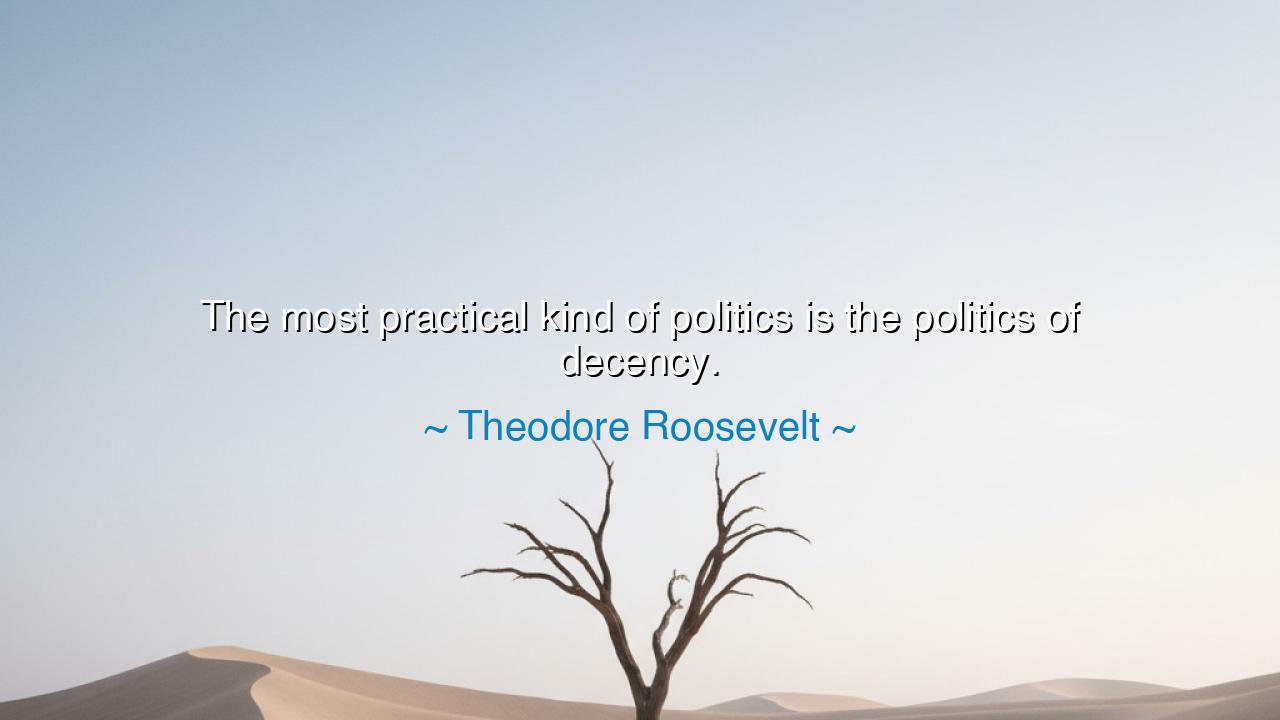
The most practical kind of politics is the politics of decency.






Hear, O seekers of integrity, the timeless words of Theodore Roosevelt: “The most practical kind of politics is the politics of decency.” In this saying, the Rough Rider, soldier, and president reminds us that true strength in governance does not rest in cunning schemes or ruthless power, but in the simple, steadfast virtue of decency. What is practical in politics, he declares, is not deception or cruelty, but honesty, fairness, and respect for the people.
For Roosevelt was no dreamer of idle ideals. He lived amidst the turbulence of trusts, corruption, and fierce partisan battles. He knew the temptations of politics, how easily leaders cloak themselves in empty rhetoric while serving greed. Yet his wisdom was this: only by practicing decency could a politician win the enduring trust of the people. The practical foundation of power, stronger than wealth or intrigue, is the loyalty born of respect.
History gives proof of this teaching. Consider Abraham Lincoln, who in the midst of civil war refused to abandon his humanity. His decency was not weakness, but power, for it allowed him to heal wounds, to reach across divisions, and to bind the nation anew. In contrast, countless rulers who scorned decency—tyrants who governed by cruelty or deceit—won power for a season but lost it with their legacy despised. Thus we see: decency endures, where fear fades.
Roosevelt himself embodied this creed in the Square Deal, promising fairness to workers, business, and consumers alike. He sought to tame the giants of industry not through hatred, but through justice. His politics was practical precisely because it was decent; it solved problems by upholding fairness, not feeding corruption. His life showed that decency is not weakness, but the highest form of strength.
Therefore, O children of the future, hold fast to this lesson: the most practical politics is not the loudest, nor the craftiest, nor the cruelest. It is the politics rooted in the dignity of human beings and the pursuit of fairness. For armies may conquer, and wealth may dazzle, but only decency builds nations that endure. Let this truth be carved in memory: to serve the people with respect is the strongest power of all.






HNHuyen Nhu
While Roosevelt’s idea of decency in politics sounds appealing, it feels increasingly hard to imagine in today’s political landscape. With leaders often resorting to populism, manipulation, and polarized tactics, can decency really be a viable approach? How can we encourage political leaders to prioritize decency and integrity when they face immense pressure to win at all costs? Is there a path back to a more civil, ethical approach to governance?
MP10CT2-27- Le Tran Minh Phuong
Roosevelt’s statement raises the important question of what 'decency' in politics truly means. Does it involve respecting human rights, being transparent, or listening to all voices? If we define politics by decency, how can we ensure that such values are applied consistently, especially when decisions affect millions? Is it possible for a government to function effectively while upholding the highest moral standards, or do we need to make compromises?
KNKim Ngan
The notion that decency is the most practical kind of politics resonates strongly, especially in times where divisive rhetoric seems to dominate. But can decency really drive practical political outcomes, or is it too idealistic? How do we balance decency with the realities of political negotiations, where compromise and tough decisions are often required? Should we strive for a political system rooted in kindness, or is it more important to focus on results?
ATAn Tran
Roosevelt's idea that the most practical politics is the politics of decency seems like a refreshing reminder that at the heart of good governance should be basic human respect and fairness. In today’s polarized world, can we still implement this kind of decency in political discourse? Or has the pursuit of power become so ruthless that decency has taken a back seat? How can we restore decency to politics without it being perceived as naive?